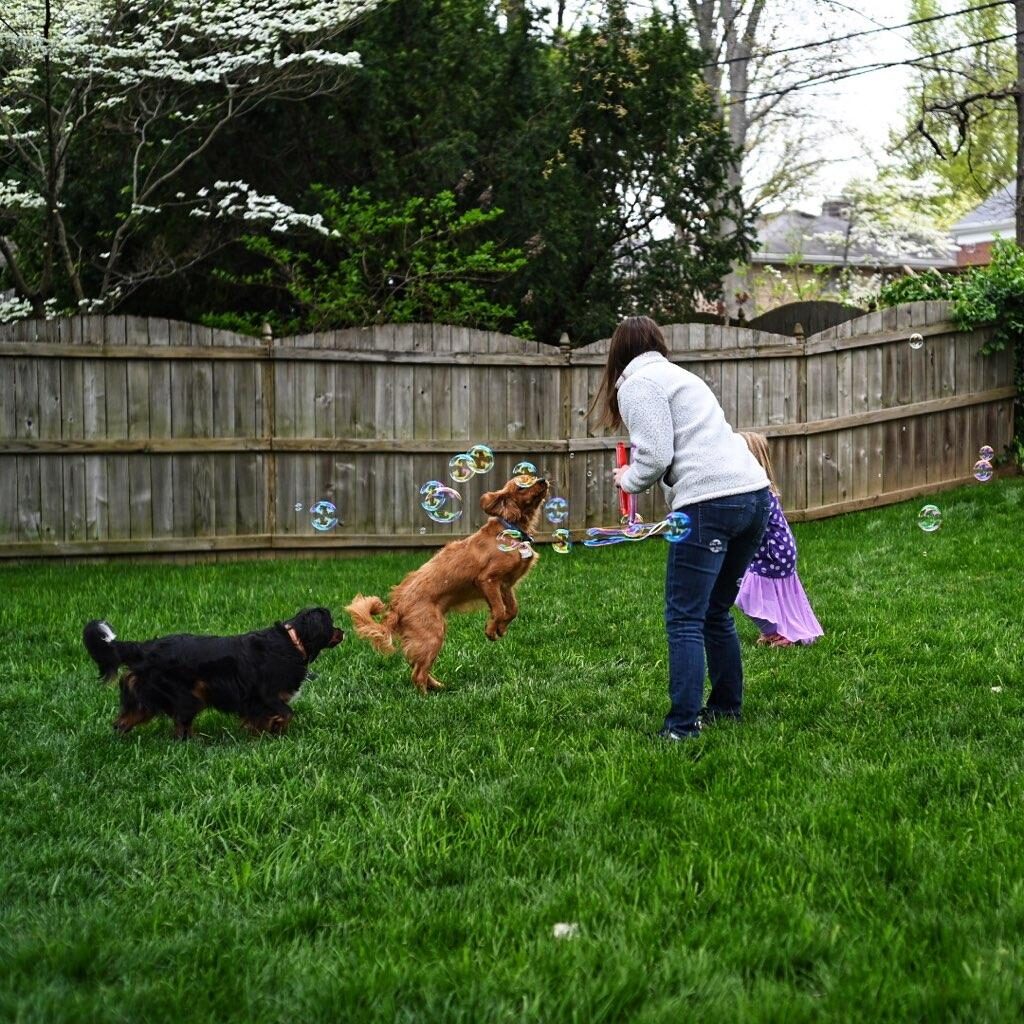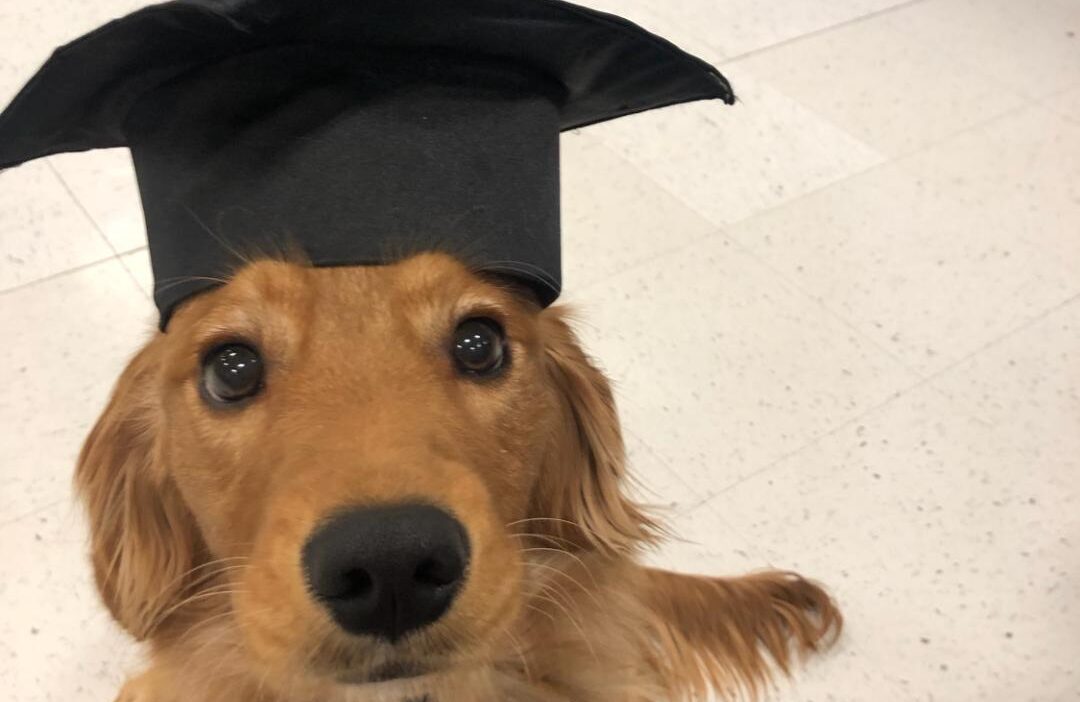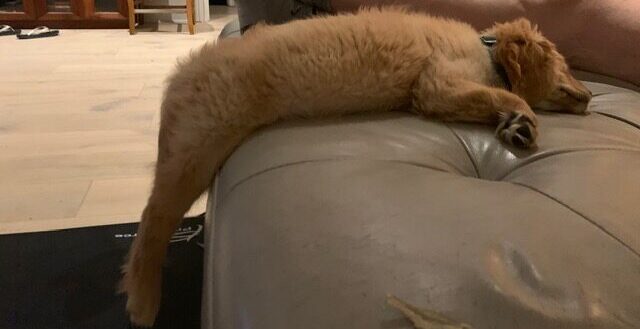A well-socialized puppy is more likely to play confidently and in a more relaxed behaved manner. Social skills begin fast for puppies, and play is a big part of that socialization.
Soaking up all that stimuli around them immediately after birth is important. Puppies communicate non-verbally by absorbing the sounds, smells and postures associated with learning. It’s almost as if happiness is instinctual and once they exhibit their ability to play… they can’t wait for us to join along in the journey.
Why Do Puppies Need To Play?

Motor and Social Skills are Developing Through the Fun of Play Time!
A stronger strategy of play begins 2 to 4 weeks of age. It’s a chance for puppies to try out those brand new teeth. Teething is a way for puppies to include themselves in a playful social life. Play-biting and play-fighting merge with the love of rambunctious play. A ratio of five minutes of play per month of age up to twice a day, for a maturing puppy is a good place to start.
Puppy personalities don’t really show until around 6 weeks old. Their temperaments develop in what can seem like a roller coaster ride: one minute they’re snoozing, the next they’re barking and ready to play.
It’s important to know puppies should stay with their mom and littermates up until. This helps a puppy learn bite inhibition skills that will assist in polite play later in life.
Puppies around month 3 enjoy social play, which provides them with mental enrichment. Soaking up their emotional environment. Basic emotions of fear and happiness have formed.
Strong human attachments are ready to be molded, shaped and now puppies are ready to engage!
Did you know the mental benefits of emotional bonding with humans can lower puppy stress levels? This will also guard against developing undesirable behaviors later in life. And here you thought you were getting a puppy to manage your emotional wellbeing! So let’s play!!!
Signs Your Puppy Is Ready To Engage In Play
- Play growl accompanied with relaxed body movements
- Non-stressed happy stance positioning
- Raised paw
- Sportful grunts, whines and yips
- Playful darting
- Wagging tail
Puppy aggression is normal. Abnormal play behaviors exhibit a stiff and fierce attitude with deep tone growls and fixed gazing. Impulse control is still in formation during these early months. Emotions can become overstimulated during the excitement of playtime. Nip unwanted behaviors in the bud to keep puppies on track to develop into happy compatible dogs.
Teaching Puppies To Play Nice

- Monitor for stress cues
- Redirect a rival to a new play area accompanied by a toy
- React vocally to bites with “OUCH!” and avoid negative name association
- Use air, water or sound to break attention
- Engage situation with a leash setting up for a more secure environment
- Introduce a “Time Out” or “Game Over”
At 7-8 weeks of age puppy training begins. Puppies love brief intervals of play time mixed in with training. Challenging smart games will fuel their confidence and boost brain development.
Let’s look at some playful fun games to make your puppy stronger, faster and smarter!
Puppy Pinball
Form a circle with friends or family. With treats in hand, place the puppy in the center of the circle. One at a time, each person calls for the puppy. This teaches the puppy face recognition, trust and .. treats galore!! This continues their socialization and gets them used to their new family
Validated Puppy Walks
Limit the walk to five minutes for each month of age. It is recommended to use a 4-6 foot lead, not an extender leash. Every time your puppy looks back at you, praise your puppy and share a treat! To help the process along, say their name or make silly sounds.
Hide and Seek
One person gently restrains the puppy while the other person hides. Call the puppy’s name until they find you and praise them with a treat or toy. This game activates the adrenaline hormone and strengthens their mental mechanism of recalled behavior reinforcing their scent tracking ability.
Fetch
This is a healthy game for both you and your puppy!
- Choose a toy that is the appropriate size; something small and easy to grasp. Your puppy is learning, so let’s make it easy for them to snatch and hold.
- Once your pup is interested, throw the toy a few feet. Signal your puppy to go after it and then return it. Common command words are: fetch, good fetch, come and release.
Keep the enthusiasm flowing as your puppy catches on more and more. This is a game with a steep learning curve. Repeat. Repeat. Repeat equals reinforcement.
Golden Cavaliers Truly Offer the Best of Both Worlds
The Golden Cavalier is a dog that comes from two very intelligent breeds. These play time games mixed with playful training tips will be ideal for your new happy puppy! Once grown, your dog’s intensity needs will increase.
This is a breed that loves to be active, playful and on the go! Besides training and playtime activities don’t forget to incorporate daily walks, short runs and heaps of praise!!
But don’t worry, these are ‘active dogs with an off switch’ who love to run and play as much as cuddle on the couch. The best of both worlds? We think so!

Your Golden Cavalier puppy will grow up fast into an adult dog and it’s important to enjoy every step of the process. Even after your dog grows up, steady play time will help keep your Golden Cavelier and your entire family young at heart. With proper exercise, mentally stimulating games and affectionate hugs, you’ll be on your way to raising not only a naturally loving companion, but a best friend.
Guest article written by Sarah Ihrig

Nice article, thanks!